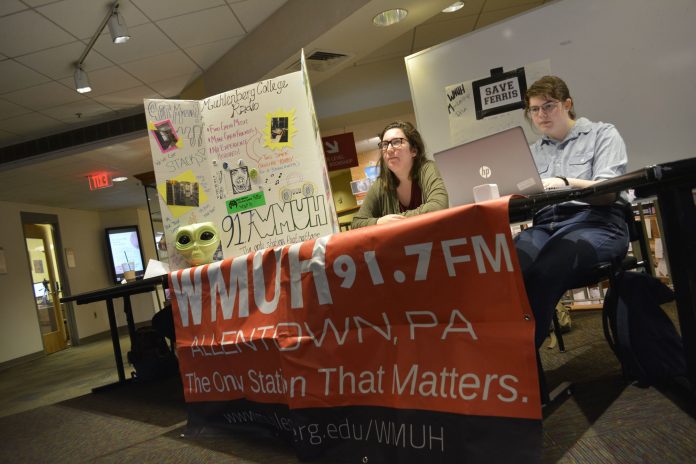
On a daily basis, representatives from the various on-campus clubs spend hours at a time tabling in Seegers Union to promote and fundraise for their respective organizations. With the tables strategically placed directly facing the Union’s entrance, it is nearly impossible to not catch a glimpse while walking through the red doors.
“Any college department or student organization in good standing may reserve a market table,” says Glenn Gerchman, the Director of Seegers Union & Campus Events. “The market tables are managed as part of 25Live and follow the same protocols for reserving other locations such as the Event Space or the Student Life Conference Room.”
25Live is the software used for scheduling events across campus. While anybody with a Muhlenberg College network login can access it, only faculty, staff, and certain student leaders from on-campus organizations can use it to reserve event spaces like tabling in Seegers.
“We ask for reservation requests to be submitted at least two weeks in advance, but we do our best to accept requests for available market tables with shorter notice whenever possible,” notes Gerchman.
In terms of availability, if the building is open, then tables are free for reservation. The typical time periods for Seegers tabling range from 11 a.m.-1 p.m. and 2 p.m.-5 p.m. These time slots hit the highest traffic throughout the lobby.
Of course, there are exceptions for when tabling is not prohibited.
“During College signature events such as Family Weekend and Alumni Weekend, for example, we do not accept reservations for solicitation as we want to keep the focus on our guests and not have them feel like they’re being pressured into making purchases or taking the focus off of event activities” explains Gerchman.
The language of solicitation that Gerchman refers to comes from the Vendor Sales & Solicitation Policy. According to the introduction to the policy, which can be found on the Muhlenberg College website on the Seegers Union page:
“The College feels that student organizations should be provided with opportunities to raise their own program funds through fund raising activities. In order to provide a means of protecting the College, the student organization and each member of the College Community from undue intrusion and provide fair access for legitimate activities, the following guidelines and restrictions have been approved.”
The policy itself is split up into 10 points, and goes over guidelines relating to finances, unpermitted solicitation activities, specific approvals needed for certain requests and more.
An example of a specific office that has had to provide approval in the past is the Treasurer’s Office.
“I must say that it’s been quite some time since our office has been asked to review or sign off on a request to table, or solicit, in Seegers,” recollects Jason Feiertag, Assistant Treasurer. “That being said, our office typically gets involved when there are any questions involving liabilities, risks or business that might conflict with our on-campus providers such as the Bookstore and Sodexo Dining Services.”
Outside vendors also have to go through a certain process to be able to solicit in Seegers, explains Gerchman.
“Vendors or non-College organizations do not have direct access to reserve a table,” says Gerchman. “If a vendor, such as the poster sale or jewelry vendor, or even a student wanting to sell wares, has an interest in selling on campus, they must be sponsored by a college department or student organization.”
Collaboration with the Office of Student Engagement is typically necessary in order to pair vendors with on-campus organizations.
“Usually vendors reach out to our office to try and sell things on campus,” explains Ellen Lentine, Associate Director of Student Engagement for Student Activities and Events. “If I, or someone else in Student Life, happen to be already working with a group who is trying to raise funds, we will connect the vendor in the organization.”
Sometimes a group may not currently be fundraising. In that case, Lentine notes, “If a vendor contacts our office and we do not know of any groups currently needing fundraising assistance, I will try to connect that vendor to like-minded organizations.”
Lentine provides a hypothetical example of a vendor selling yarn, and how they would be paired with an organization like Knit Wits.
“We rely on student organizations to be stewards of the programs supported through the market tables” says Gerchman.
There is definitely an urge to pay special attention to who is coming into Seegers, especially following the solicitation incident this past February where two women approached multiple students asking about “God the Mother.”
Other instances mimicking it make it evident that students should be conscientious about who they are giving their contact information to. Future revisions to the Sales & Solicitation Policy will also be made as needed to ensure that those entering and officially promoting in Seegers are warranted to do so.
This summer, there will be an assessment of the current policy. “If deemed necessary, we will work with campus stakeholders and the Seegers Union Student Advisory Board (SUSAB) to review changes and update in the fall,” notes Gerchman.
Sydney Coplin is a senior majoring in Media and Communication. She is currently spending her final semester of college interning and studying in Washington, D.C. She has previously been on staff as News Editor and Managing Editor.





















